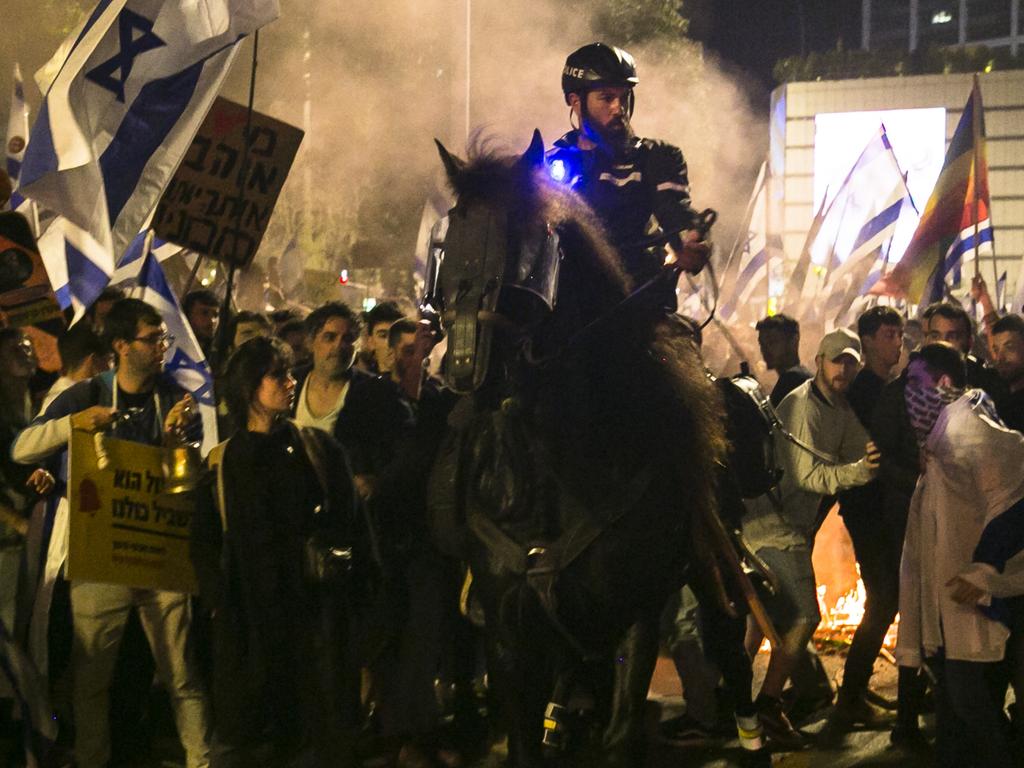
The road from the airport to Tel Aviv, where the Kirya – Israel’s defence headquarters – is located, was blocked by the biggest protests Israel has seen in more than a decade. Hundreds of thousands of Israelis have been turning out, week after week, to protest against a judicial overhaul proposed by the government of Benjamin Netanyahu.
These protests reached a crescendo this week after Netanyahu sacked his Defence Minister, Yoav Gallant, a fellow Likud member and a former senior Israeli general. In a nationwide strike, flights were grounded at Israel’s sole international airport, while Israeli diplomatic missions around the world downed tools.
Gallant had publicly urged Netanyahu to hit pause on his judicial reforms, warning that the growing societal rift was increasingly penetrating the Israeli Defence Force and security agencies, and that this posed a “clear, immediate and tangible threat” to the security of the state of Israel.
I came to know Gallant almost a decade ago, when I was Australia’s ambassador in Israel. He had just retired from the army, having narrowly missed out on the top job as IDF chief of staff, and was yet to enter politics. He was on my radar as a future politician and probable defence minister.
Gallant’s entire professional life has been devoted to Israel’s security, and he is generally conservative on domestic and social issues. So his stark public warning to Netanyahu carried particular weight.

Gallant, along with other security chiefs, was alarmed by the growing number of IDF reserve officers joining the protests, and threatening to refuse to report for service if the judicial reform laws passed.
In the past week alone, more than 300 air force reservists and over 600 military intelligence reservists said they would boycott training in protest. They joined members of the 69th squadron, one of Israel’s most prestigious air force units, and reservists from the elite 8200 intelligence unit.
With a small standing army, Israel depends greatly on its reserve force to fill combat roles in times of crisis. The air force, military intelligence, cyber warfare units and special operations groups all depend on these reserve forces to function during high-tempo operations.
Gallant recognised Netanyahu’s judicial overhaul was creating deep social divisions, with the potential to impact Israel’s military preparedness and capability to function. As the minister responsible for Israel’s defence, he had little choice but to issue such a warning.
The reason Netanyahu’s proposed overhaul of the judiciary has proven so deeply controversial and divisive, leading to the biggest street protests in more than a decade, takes some explaining.
Israel has had an activist judiciary since the early 1990s.
In the absence of a written constitution, and with no upper house or review chamber in Israel’s parliament, the Supreme Court has taken upon itself the responsibility of protecting individual and minority rights against executive or legislative overreach.
In doing so, the court has assumed an important role in preserving Israel’s liberal, democratic character, but one for which, Netanyahu and his coalition partners argue, it lacks legitimacy.
The legislation Netanyahu’s government is seeking to pass would allow a simple majority of parliament to vote to override any decisions by the Supreme Court.
It would limit the scope of the court’s judicial review powers, restricting its ability to interfere in the workings of government. And it would give the executive control over the committee that appoints new judges.
The reforms, in short, will elevate the legislature and the executive above the judiciary, ensuring nearly unchecked majoritarian rule in Israel.
There are three main reasons Netanyahu’s new governing coalition is pushing forward with this constitutional reordering as its first item of business.
The first is the growing populist bent of his party, Likud. Menachem Begin, Likud’s first prime minister, was a staunch defender of minority rights and independent institutions. Under Netanyahu, Likud has transformed into a more populist centre-right party, railing against legal and constitutional limitations and various elites for frustrating their agenda.

The second is driven by Netanyahu’s coalition partners. His nationalist religious coalition partners, led by Bezalel Smotrich and Itamar Ben-Gvir, are supporters of expanding Israel’s settlements in the West Bank, and have long been opposed to the role Israel’s courts have played in frustrating and slowing the pace of this enterprise.
The religious ultra-orthodox parties, the other main part of Netanyahu’s coalition, have been strident critics of the courts for decisions they see as interfering in religious life, and frustrating their attempts to expand the religious character of Israel. The court has ruled, for instance, that a law exempting the ultra-orthodox community from military service was invalid, and declared that non-Orthodox converts to Judaism qualify as Jewish.
The third is personal. Netanyahu is facing charges for bribery and fraud by a justice system he believes has become too powerful and politicised, and this move would weaken it. A law passed last week would prevent the judiciary declaring the prime minister unfit for office, protecting Netanyahu’s position. But the reason this policy debate has transformed into a political crisis is because it reflects profound and deepening social divisions within Israel itself.
Those opposed to the reforms and taking to the streets are overwhelmingly Israelis who have served in the military, work in the modern economy and wear their religious beliefs lightly. They wish to see Israel’s secular, liberal and democratic character endure.
And they are alarmed at the country being taken over by previously fringe political leaders, many of whom have not served in the military, taking the country in a direction that will undermine its democratic character and compromise its security.
But demography is moving against them. The national religious and ultra-orthodox communities are the fastest-growing in Israel, reflecting their higher birthrate. This government marks the first time they have made their growing political weight felt, but the trendline is with them.
As one former intelligence officer told me, Israel’s social compact – in which these different communities largely leave the other’s prerogatives and way of life untouched – is being challenged by this new political order. Though the issue at hand is domestic in nature, it carries profound consequences for Israel’s security.

Israel’s foremost national security priority remains preventing Iran from acquiring nuclear weapons. This has taken on added urgency with the recent discovery that Iran has been enriching uranium at a level that approaches weapons grade. But assembling the necessary international coalition to tackle Iran’s nuclear ambitions is difficult when judicial reform is taking up all the government’s political bandwidth, and when partners in the US and Europe are growing alarmed at the anti-liberal program of Israel’s new government.
While Netanyahu was preoccupied with judicial reform, Saudi Arabia restored diplomatic relations with Iran in a deal facilitated by China. The coalition within the Middle East opposed to Iran’s expansionism, carefully cultivated and nurtured by Israel, is threatening to come apart.
The West Bank is a tinderbox, with new factions of Palestinian militants emerging that are more radical and more committed to violence. This year has already been one of the deadliest for both Palestinian and Israeli civilians, with deadly clashes involving the IDF in West Bank towns, and terrorist attacks on Israeli settlements.

And the Abraham Accords, which represent the largest improvement in Israel’s strategic position in recent years, are coming under strain. The accords enabled Israel’s normalisation of diplomatic relations with Arab states including the United Arab Emirates, Bahrain and Morocco.
But these countries all have publics that remain committed to the cause of a Palestinian national state. The expansionist and anti-Palestinian agenda of Israel’s new government is causing disquiet in these capitals.
Netanyahu, who promised to make his first overseas visit as Prime Minister to Abu Dhabi, keeps finding the invitation postponed. Last week Khaldoon al-Mubarak, one of the UAE’s top officials, was dispatched to Israel to warn Netanyahu of the need to ease tensions with the Palestinians.
Earlier, Israel’s government was forced to clarify that it still respected its 1994 peace treaty with Jordan after Finance Minister Bezalel Smotrich stood at a podium with a map of Israel that included Jordan and the West Bank.
Israel’s tech sector, source of much of Israel’s economic and employment growth in recent years, traditionally stays out of politics. But it, too, is warning that the attacks on the judiciary are hurting Israel’s business reputation and threatening investment in the sector from foreign multinationals.
Faced with this growing crisis, and warnings from President Isaac Herzog that the country was headed down the path of civil war, Netanyahu has sensibly pulled back. He has put the reforms on ice until parliament resumes in May, but has hit out at what he described as “an extremist minority” behind the protests.
What Netanyahu elects to do next, and whether he shelves these reforms entirely, will define his legacy. He wants to be remembered as the leader who secured Israel and entrenched its place in the volatile Middle East. But the path he is being taken down by his coalition partners heads in the opposite direction.
Dave Sharma is a former Australian ambassador to Israel, 2013-17, and is the former Liberal member for the federal seat of Wentworth.








When US Secretary of Defence Lloyd Austin visited Israel last month, he was confined to the airport for the duration of his visit.